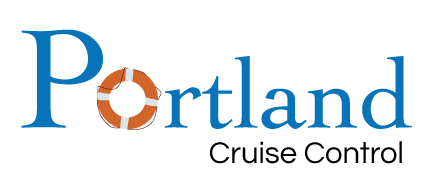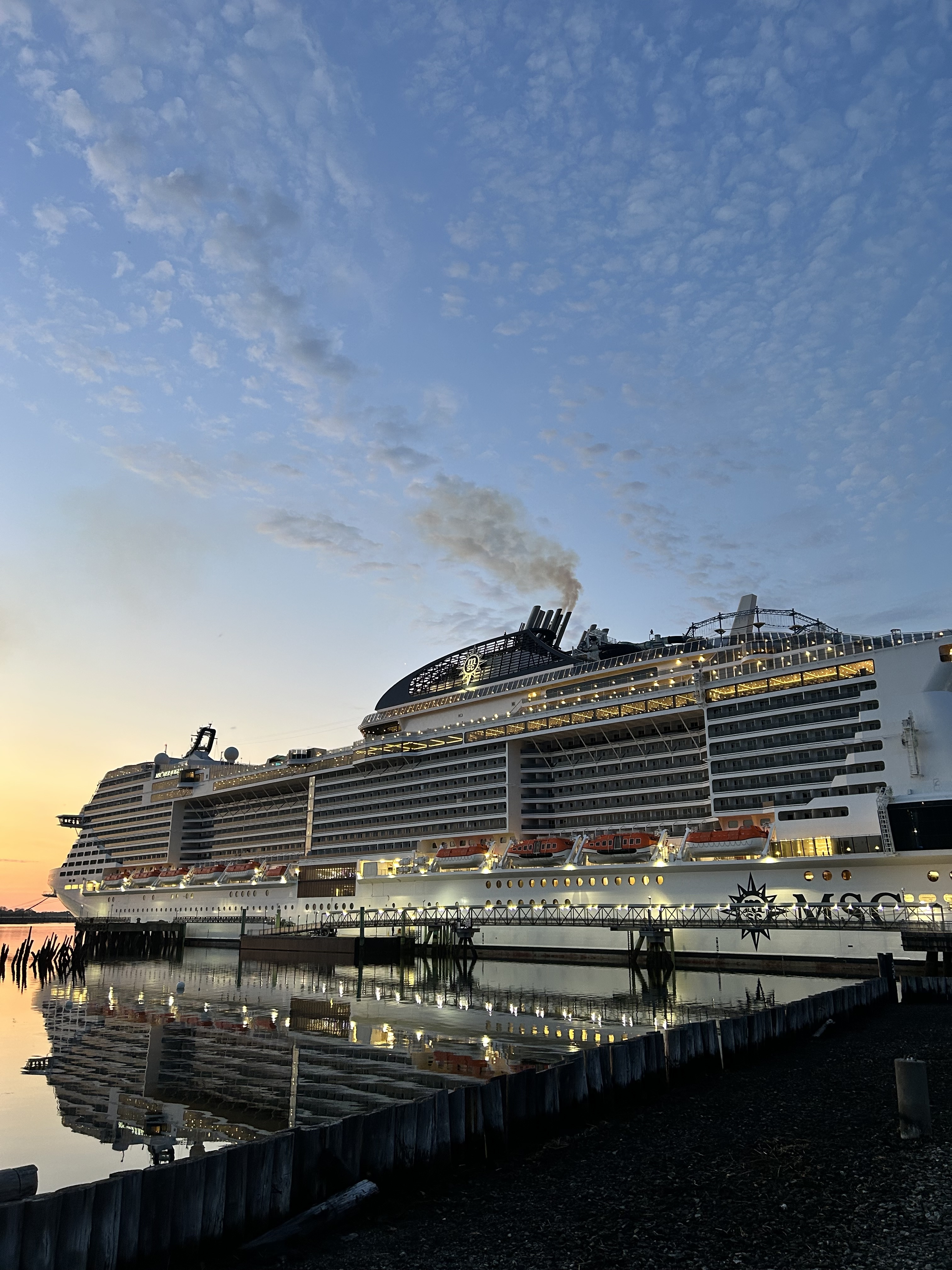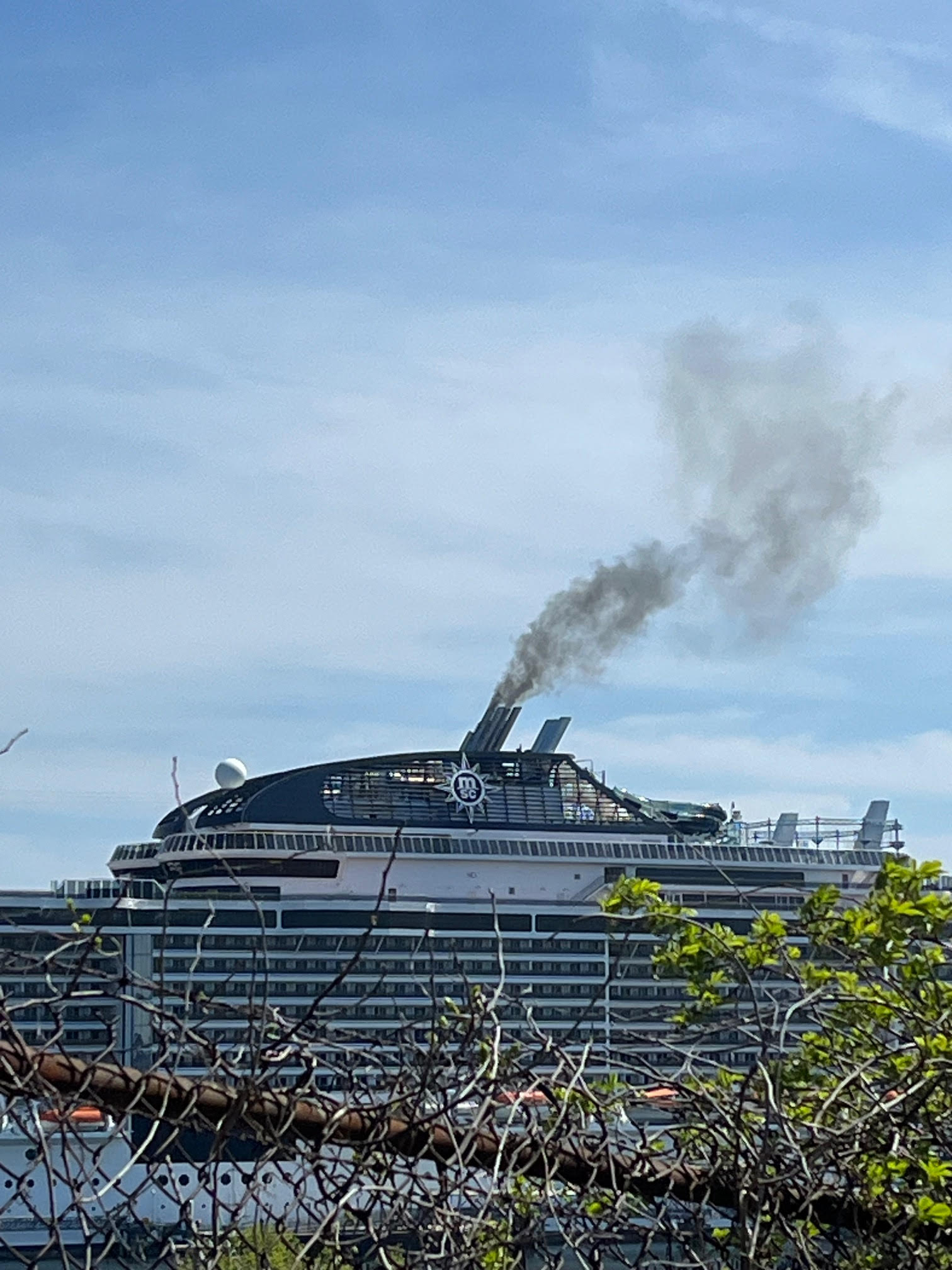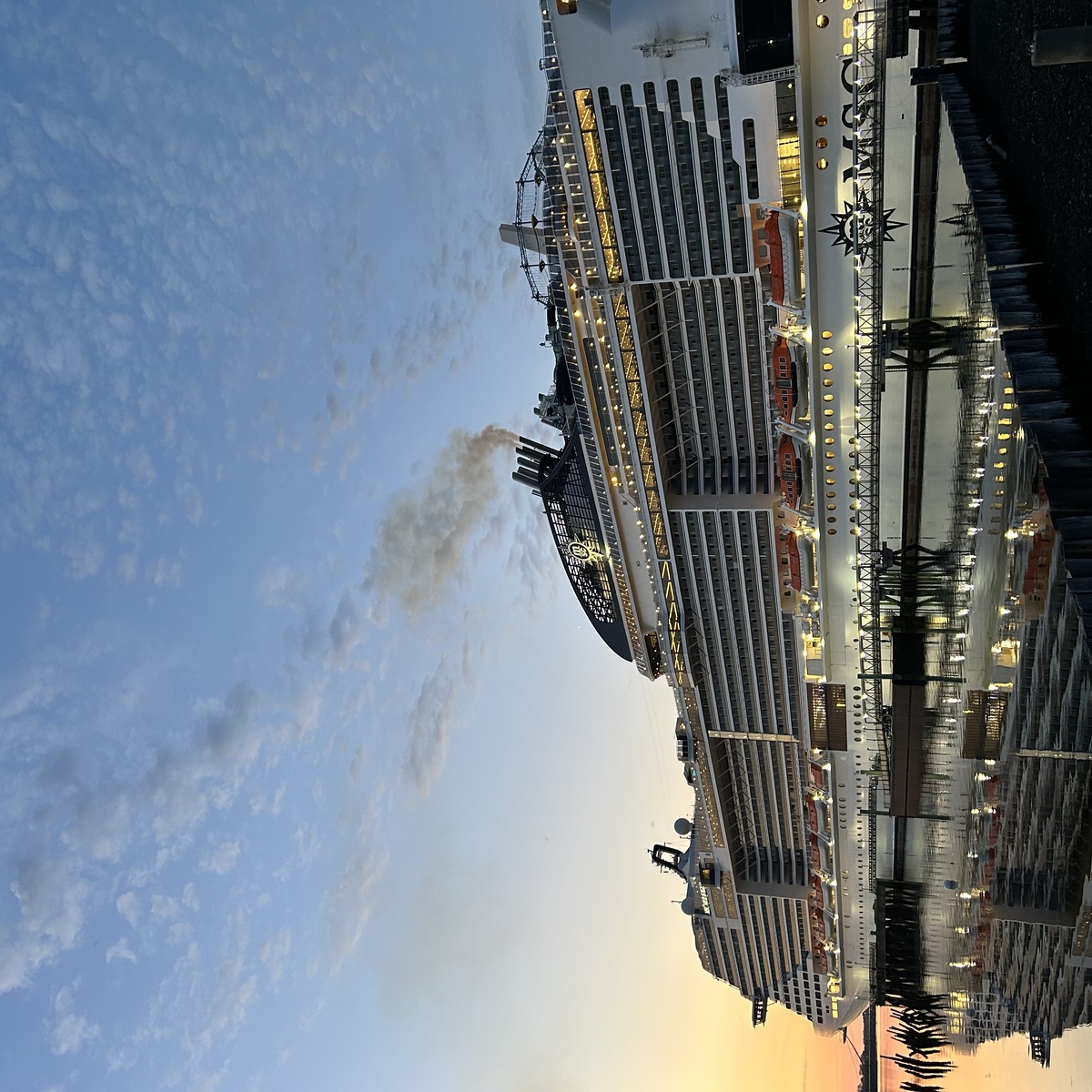

Scrubber Wash Ban Proposal
The purpose of this proposal is to recommend that scrubber wash discharge be prohibited while the ships are idling for the approximately 8 hours while they are docked in port. The method for prohibiting scrubber wash discharge will be to include it in Rule 8 of the Portland Port Terminal Tariff.
The proposed scrubber wash discharge prohibition does not change the number of port calls, cruise passengers, or revenue paid to Portland. Instead, the ban dramatically decreases the pollution caused by the cruise ships while they are at dock by requiring them to use a clean distillate fuel, like marine gas oil (MGO).
Overview: 2025 Cruise Season
During the 7-month cruise season in Portland, we will receive 97 ships, of which 87 have installed Exhaust Gas Cleaning Systems (EGCS), also known as scrubbers.
The reduction in pollution using MGO compared to scrubbers with heavy fuel oil (HFO) is outlined here. In brief, direct carbon (CO2) emissions, particulate matter, and black carbon emissions are all reduced when using MGO compared to scrubbers, which use HFO. Toxic scrubber wash discharge is eliminated when scrubbers are not used.

Why are scrubbers being used by the cruise industry?
The International Maritime Organization's global fuel sulfur limit reduced the maximum sulfur content for marine fuels from 3.5% to 0.5%. (In the Emission Control Area-ECA it is 0.1%) Rather than switch to the more expensive (MGO) low-sulfur fuel, the majority of cruise ship companies have installed scrubbers as a cheaper solution, allowing them to maintain their use of Heavy fuel Oil (HFO).
What water pollution is caused by scrubbers?
Scrubbers remove harmful pollutants from the exhaust gasses produced by a ship's combustion engine and discharge them into the water.
An "open loop" scrubber constantly discharges large amounts of wastewater that is acidic and contains polycyclic aromatic hydrocarbons (PAHs), particulate matter, nitrates, nitrites and heavy metals including nickel, lead, copper, and mercury. These pollutants are discharged into the marine environment where they damage marine ecosystems, threaten marine wildlife, and degrade water quality.
Recent scientific studies show that scrubber discharge is extremely toxic to marine life at very low concentrations, and scrubber discharge may have a serious impact on the populations of key species of marine food webs. In 2024 Pacific Environment compiled 26 studies showing the substantial breadth of the current data. Additionally, in their 2025 publication, they summarize the five most recent scientific studies.
The growing evidence of scientific data indicates there is virtually no safe concentration of scrubber effluent and that it negatively affects organisms throughout the marine food chain. The sources referenced found that concentrations of scrubber wastewater as low as 0.0001% have toxic effects on marine life. For this reason, there have been 93 bans and restrictions on scrubbers internationally, ranging from the port to national level and, most recently, in Denmark and Sweden.
In addition to adverse effects on marine life, exposure to and consumption of these toxic pollutants found in scrubber wash discharge water have been documented to cause cancer, affect neurological development in children, and lead to a host of other debilitating impacts on human health.
Cruise ships are among the largest scrubber polluters, accounting for about 15% of scrubber discharge worldwide. Per Kay Brown, policy director of Pacific Environment, "Cruise ships discharge an estimated 6.3 to 8.7 million gallons of scrubber waste per day from one medium-sized ship."
Scrubber bans
Internationally, scrubbers have been banned and restricted in over 45 countries with 58% of the bans in ports. In the US scrubber wash discharge is banned in California, Connecticut, and Seattle. In Canada, scrubber wash discharge is prohibited in Vancouver.
Both Seattle and Vancouver have utilized their Terminal Tariffs to successfully prohibit scrubber wash discharge in their ports. In Seattle, where scrubber wash is banned as a part of their Terminal Tariff and Puget Sound MOU, the Goverment Relations and Environmental Teams have confirmed; "While VIDA may bring changes to what is required or permissible in WA, our at-berth wash water prohibition, and other decisions we make through our tariff are unimpacted and independent of VIDA. Typically, the environmental requirements we issue go above and beyond current law. This is also the case for the cruise MOU; it’s a voluntary demonstration of action in addition to and beyond regulation."
Portland Terminal Tariff Revision
The proposal would revise Rule 8 of the Portland Terminal Tariff to prohibit scrubber wash while ships are at dock, along with the already banned discharges of untreated sewage, greywater, and dirty ballast water.
Rule 8 in the Terminal Tariff prohibits "greywater, dirty ballast or other fluids" while the cruise ships are berthed. We are asking to specify “exhaust gas cleaning system wash water” as one of the “other” fluids.
Current Rule 8: The discharge of greywater, dirty ballast, or other fluids deemed prohibited by the Director or designee while berthed at municipal facilities is prohibited.
Revised Rule 8: The discharge of greywater, dirty ballast, exhaust gas cleaning system wash water, or other fluids deemed prohibited by the Director or designee while berthed at municipal facilities is prohibited.

Summary
The solution is for cruise ships to burn clean distillate fuel, which eliminates the need for scrubbers. Since this isn't being done voluntarily by industry, Portland needs to enact a scrubber wash prohibition as part of our Port regulations. This ban requires that the cruise ships visiting Portland be responsible for mitigating the tremendous pollution they have been causing, while not impacting Portland financially. The prohibition is urgently needed to protect the health of our port, marine environment, and community.
Scrubber Wash Ban Endorsements
"The damaging toxic effects of open loop scrubbers are indisputable. They are not confined to the immediate vicinity of the vessel releasing discharge but can extend large distances depending on weather (wind direction, speed, etc.) and oceanographic (currents, sea water temp, etc.)."
"As a marine scientist and 8th generation Mainer I am concerned about impacts from Exhaust Gas Cleaning System (scrubber) discharges from cruise ships. It seems obvious that any cruise ship discharges described as "toxic to marine life" should be prohibited in marine areas as productive and economically valuable as Casco Bay. Entire countries, such as Sweden, have recently prohibited scrubber discharges into their waters. They join 45 other countries in recognizing the damage caused by scrubber wash discharge. I would like to see The Port of Portland protect Casco Bay, where I grew up, by following the lead of the Port of Seattle, which prohibits cruise ships from discharging exhaust gas cleaning system (scrubber) wash water while at berth."
"It is only common sense that the prohibition on cruise ships discharging of untreated sewage, greywater, and dirty ballast while at dock be extended to scrubber wash. Prohibiting the practice of discharging scrubber wash with an effective and available alternative will reduce direct carbon (CO2) emissions, particulate matter, and black carbon emissions, improving the health of Portland citizens and the visitors on the cruise ships themselves."
"Cruise ship scrubbers don't eliminate pollution—they just transfer it from the air to the ocean. Their toxic wastewater discharge contains heavy metals and carcinogens that threaten marine life and human health. Banning this discharge is a smart, overdue move that brings Portland in line with other leading ports and protects the people we love and the places we call home."
"A growing body of scientific evidence shows that the toxic poisons discharged from ships using Exhaust Gas Cleaning Systems (EGCS, known as scrubbers) damage the marine environment and increase human health risks. Scrubber wastewater is highly toxic, significantly hotter and much more acidic than the surrounding waters. It contains various pollutants, including heavy metals, polycyclic aromatic hydrocarbons (PAHs), nitrates and nitrites, sulfates and particulate matter. Even at extremely low concentrations — just 0.001% — scrubber pollutants can harm marine life and disrupt biological processes that harm ecosystems, ocean resources and coastal communities.
Given the significant risks and harms from scrubber discharge, regulations like the proposed revision to Rule 8 of the Portland Terminal Tariff to prohibit scrubber wash discharge while ships are at dock, are appropriate and justified."
"Scrubbers merely convert ship smokestack pollution into toxic water pollution. Scrubber wastewater is incredibly harmful to the marine environment, the marine creatures that inhabit it and our communities which rely on a healthy ocean for fishing, recreation, and tourism. Portland should join more than 50 port and state jurisdictions around the world (including the Ports of Vancouver and Seattle and the State of Connecticut) and ban the discharge of toxic scrubber wastewater from cruise ships."
"Switching to cleaner fuel in ports is an easy step for the cruise industry and is something they do all the time here in Alaska. Whether it's crab country or lobster country, dumping polluted scrubber washwater can and should be avoided wherever possible — we don't need unnecessary toxins in our ports and where we recreate and get our food. A port tariff scrubber discharge prohibition is a smart and effective approach for Portland."
"Recently the 16 parties to the OSPAR Convention decided to ban scrubber waste water discharge in internal waters and port areas in the north-east Atlantic on the basis of robust scientific evidence, stemming from extensive technical scrutiny by governmental scientists. Exposure to and consumption of toxic pollutants found in scrubber discharge water have elsewhere been documented to cause a serious threat to marine life, causing lethal and sub-lethal effects, and may have other serious effects such as bioaccumulation, acidification, eutrophication, and cancer, affecting neurological development in children.
The future of shipping does not lie in prolonging the use of fossil fuels but rather in investing in clean technologies and fuels that align with environmental and climate objectives. Portland should join the growing movement of bans on discharges in port areas."
The Portland Climate Action Team (PCAT), with over 100 Portland citizens as members, strongly endorses the Scrubber Wash Ban proposed by Portland Cruise Control. When enacted this provision to the tariff rule 8 will have a significant impact on improving the air quality in the city and limiting the toxins discharged into Portland harbor. We urge the City Council to immediately adopt this important measure to protect the residents of Portland.
© 2025 Portland Cruise Control. All rights reserved.
